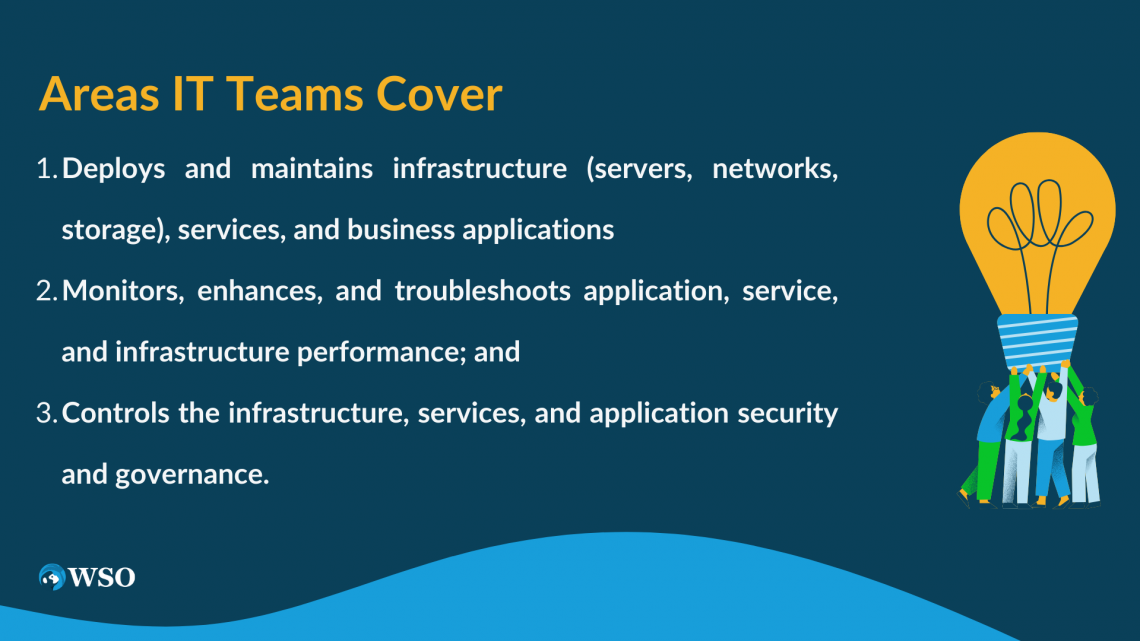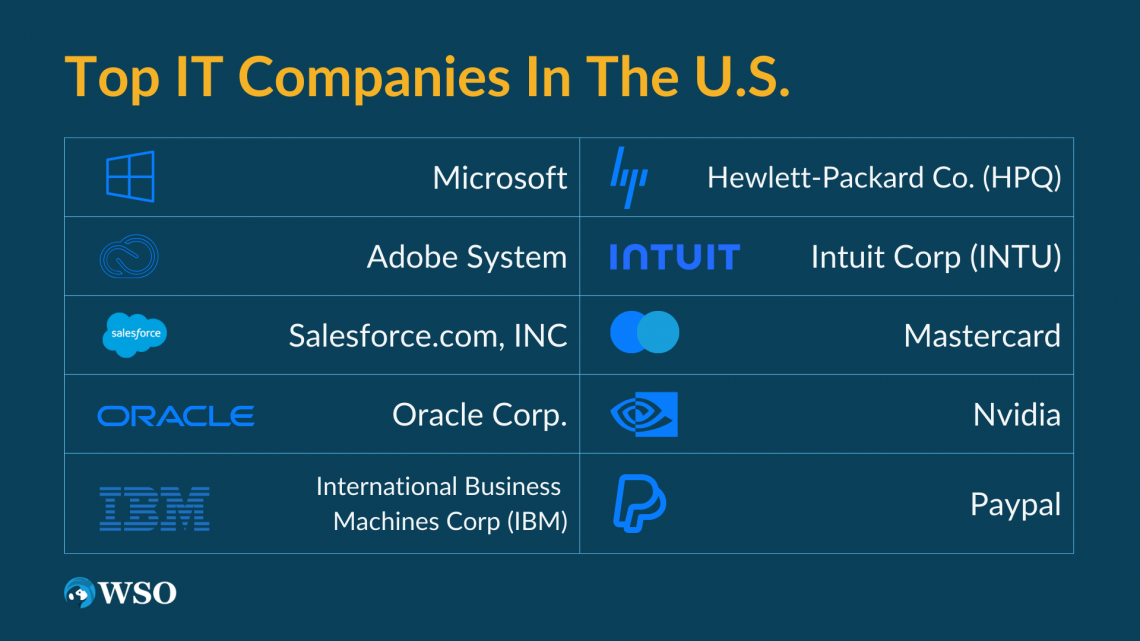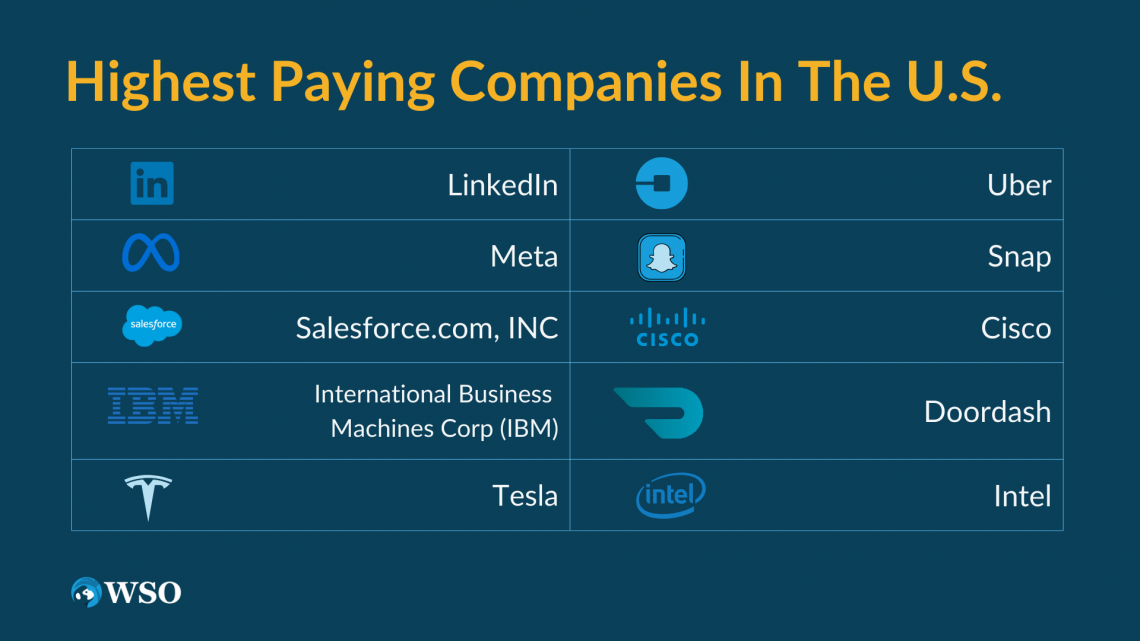IT Salary Guide
The world's most innovative and fast-growing sector
Information Technology (IT)
Information Technology (IT) is the world's most innovative and fast-growing sector.

The world's largest companies are all tech firms, such as:
Tech professionals also tend to earn high salaries compared to others.
First of all, let's talk about the occupation. Saying that someone is working as an IT professional is too broad. For example, let's say you are a surgeon who does surgery on a heart. Your friends would typically ask you for treatment of any disease "since you are a doctor."
How does it sound? I think that sounds silly. Let's take the example of finance professionals. Your friend works as a venture capital analyst with Series A round startups, so he only deals with private companies and doesn't deal with the stock market.

You are asking him what would be the direction of the S&P 500 Index? Which stocks should I buy or sell? You are the "finance person," you must know that. Not all finance professionals do the same thing—some work at a bank underwriting loans, and some trade in the stock market.
The others may provide insurance products and invest in small private companies. The same applies to IT. Saying you want to "work in IT" sounds the same as "I want to be a doctor" or a "finance professional." However, the real question is: "What job are you exactly looking for?"
The industry has been growing exponentially since the 1980s. The vast need for automation and digitization of business processes further fuels the sector.
Graduates with an Information Technology, Software Engineering, and Computer Science degree may work in various industries that heavily rely on technology.
Beside the IT sector, financial services, healthcare, manufacturing and government services are expected to hire many professionals. If you want to learn more about different sectors of the economy, check this article Industry.

The high demand from companies always causes a shortage of IT professionals. However, in some instances, you can get a job even if you are less experienced, provided that you are motivated to learn and go through training by a company. The salary you get depends on the following factors:
- Your level of experience
- Skill set
- The cost of living in your location
- Your education level
- What certifications do you have
This article will be focusing on the North American region.
Key Takeaways
- IT is a rapidly growing sector, and tech professionals often earn high salaries compared to other industries.
- In-demand roles include Business Intelligence Analysts, Data Scientists, Developers, and Security Professionals.
- Certifications like Google Certified Data Engineer and AWS Solutions Architect lead to higher salaries.
- Salaries for IT jobs can vary based on factors like location, level of experience, education, and skill set.
- Tech companies have different stages with varying compensation structures each with its own potential for growth.
IT Salary Guide – In-Demand Technology Roles In North America (Part 1)
The following IT roles are considered in high demand:
1. Business Intelligence Analysts
These analysts process the information from the market and business trends and show practical ways to increase profit, efficiency, and performance. They also record business objectives, processing documentation and specifications, and data requirements.

These professionals possess strong leadership, communication, analytical, and documentation skills. They report everything to the Business Intelligence Manager.
To work as a business intelligence analyst, you need a bachelor's degree in this area of specialization and at least five years of related experience. Some employers could also require an advanced degree.
Data Scientists analyze and extract the data and report the conclusions that fuel the efficiency of the business processes. They also cooperate with data engineers and other stakeholders on data selection, defining KPIs, preprocessing, and formatting data sets for analysis.

Data definition, extraction, and analysis are vital for data scientists. Moreover, they must derive practical insights from big data tools. They also report to the Business Intelligence Manager (or sometimes Director). It's a relatively new occupation compared with other IT professions.
To work as a data scientist, you should have a bachelor's degree and relevant work experience. An advanced degree might also be required.
3. Database Developers
Database development is a vast group of roles, and it includes:

- Database Administrator
- Database Analyst
- Database Report Writer
- Oracle Database Administrator
- SQL Server Database Administrator
Let's describe the most common role - Database Analyst. This analyst evaluates, designs, and implements the company database and maintains the storage and access of the database. He is responsible for the following:
- Identifying data sources
- Constructing data decomposition diagrams
- Providing data flow diagrams
- Documenting the process
He writes the codes so others would access, modify, and construct that database.
To succeed as a database analyst, you must be interested in this field and flexible. Also, some employers might require you to have a relevant bachelor's degree and from 0 to 10 years of work experience.
4. Developers
There are several types of developers:

- Database
- Full-stack
- Web
- Software
- Mobile
- And many other
When you hear the word "developer," you probably imagine iOS, Android, or web developer. Those developers create iOS and Android applications and websites that you use daily. So, let's talk about other types of developers.
We've discussed database developers before, so let's focus on others.
The full-stack developer designs and develops both front and back-end website architecture. In addition, these developers create and optimize new web design features. They ensure that the application or website is responsive and interactive.
Usually, this type of developer is proficient in several server-side languages and frameworks. Typically, it would help if you had a relevant bachelor's degree, such as computer science.
The front-end developer's job is to create web applications (web apps). They encode, test, debug, and support existing and new programs. They are proficient with:
Depending on the employer, you may need 0 to 5 years of work experience
IT Salary Guide: In-Demand Technology Roles in North America (Part 2)
5. DevOps Engineers
DevOps = “Software Development (Dev)” + “IT Operations (Ops)”. This engineer develops, optimizes, and maintains the software development environment. They are in charge of infrastructure, integration, build, and software deployment.

They provide system access and create email accounts. They must know many scripting languages like Python and Ruby. Employers might also require a bachelor's degree and two years of experience in this area.
Python is the leading and simple programming language in the world. If you want to work in IT, check out our Machine Learning - Python Fundamentals course.
6. Help Desk/Desktop Support Professionals
They provide technical support for customers. There are several roles within the desktop support professionals, including the Help Desk:

- Manager
- Computer Operator
- Supervisor
- Support
- Support Assistant
- LAN Support
- Technical Support Analyst
Let's focus on the entry role: help desk support assistant. The assistant helps the users diagnose and solve software and hardware problems via telephone and email communications. They document, monitor, and track the issue to provide a timely solution.
These professionals rely on guidelines and instructions for daily job functions established by the firm. They report their work to a supervisor. They need a graduate degree in the related area. Since it's typically an entry-level position, work experience is usually not required.
This administrator supports, designs, maintains and observes external and internal networks. In addition, they manage and implement all systems, apps, networks, and security configurations.

Also, the administrators resolve the issues related to the network and establish the recovery plan.
In addition, they are in charge of upgrades, patches, and new equipment and applications. In some instances, they might provide technical guidance and support to customers (users). Finally, they report their activities to a supervisor (or department head).
Employers may or may not require a bachelor's degree from candidates. The average work experience of candidates varies from 0 to 10 years, depending on the employer.
IT Salary Guide – In-Demand Technology Roles In North America (Part 3)
8. Security Professionals
The security department is responsible for the cyber-security of the firm.

There are several roles within this department:
- Cybersecurity Analyst
- Cybersecurity Architect
- Data Security Analyst
- Information Security Administrator
- Information Security Analyst
- Information Security Engineer
- Information Security Supervisor
- Application/Systems Security Analyst
For our purpose, let's focus on the Cybersecurity Analyst role. In this role, the person analyzes the systems and network of intrusions. He also monitors the security alerts to solve them as quickly as possible.
Finally, he reviews events that have potentially hazardous impacts on cybersecurity.
They constantly do real-time security audits to detect any possible threat and prioritize their response according to probability and severity. In other words, they:
- Analyze the risks
- Test the vulnerability of the information system
- Based on that, cybersecurity analysts offer solutions
Most of the roles require a bachelor's degree in the relevant field and, on average, five years of work experience.
9. Systems Administrators
This type of administrator operates and maintains computer systems or networks. They are responsible for installing, supporting, and managing the servers and solving any possible issues on time. They also install patches and make recovery backups of the system.

In addition, they are in charge of monitoring the system's configuration and maintaining the data files. They rely on the professionalism and the ability to work with limited information. They report their work to a project manager. The role requires you to be flexible.
You may need a bachelor's degree and two to five years of work experience in a relevant area.
There are many other roles, such as:
But, our article covered salaries and skills for the most widespread roles.
Exploring IT Salary Guide: Job Opportunities in North America
Employers will demand more professionals in IT if they have technical skills and certifications. As a result, your salary may rise to 10% if you possess the relevant skills your employer needs.

North American companies are looking for these skills in candidates:
- NET
- Agile and Scrum certifications
- Angular
- C#
- CCNA
- CISSP
- CCNP
- CompTIA A+
- Java
- Microsoft SQL Server
- VMware
- PHP
- PMP
Besides that, you need to be familiar with these technical skills:
- Cybersecurity
- Data analysis
- DevOps
- Cloud computing
- Machine learning
You also need to possess these soft skills:
- Ability to work in teams
- Ability to adapt to the corporate culture
- Critical thinking
- Good listening
IT certifications associated with higher salaries: Global Knowledge conducted IT Skills and Salary Survey in 2021. According to this survey, the certifications that yielded the highest salaries are the following:
- Google Certified Professional Data Engineer: $171,749
- Google Certified Professional Cloud Architect: $169,029
- AWS Certified Solutions Architect – Associate: $159,033
- Certified in Risk and Information Systems Control (CRISC): $151,995
- Certified Information Systems Security Professional (CISSP): $151,853
- Certified Information Security Manager (CISM): $149,246
- Project Management Professional (PMP®): $148,906
- Nutanix Certified Professional – Multi-cloud Infrastructure (NCP-MCI): $142,810
- Certified Information Systems Auditor (CISA): $134,460
- VMware Certified Professional – Data Center Virtualization 2022 (VCP-DVC): $132,947
You may also get these cybersecurity certifications:
- Certified Information Systems Security Professional (CISSP)
- Certified Information Systems Auditor (CISA)
- Certified Information Security Manager (CISM)
- CompTIA Security+
- Certified Ethical Hacker (CEH)
If you want to add up the cloud knowledge on top of your skills, then consider these entry-level cloud certifications:
- AWS Solutions Architect - Associate
- Microsoft Certified: Azure Fundamentals
- Google Associate Cloud Engineer
- IBM Certified Solution Advisor - IBM Cloud Foundations V2
- Cloud Security Alliance: Certificate of Cloud Security Knowledge (CCSK)
Should you get an IT degree?
Well, that's not always necessary to get a job. However, the higher the person's education, the higher their potential income.

The Bureau of Labor Statistics reported that people with
- Bachelor's degrees earn $1,474/week in 2021
- Only high school degrees make $817/week
Employers might favor people with undergraduate or even graduate degrees for some IT positions. Yes, returning to school might be intimidating to some, but the benefits it brings might be rewarding.
If you already have a bachelor's degree, you may consider a master's degree to advance or change your career. But remember one thing, everything has its price. A degree in IT implies dedicating both time and money.. So before making that decision, do your planning.
Ask yourself, "What is my long-run goal? Do I need a degree to achieve my goal? Am I willing to put my time and money into a managerial position faster?"
If the answer to the former question is yes, then go for a degree. But for a quick raise or promotion, the certifications would be enough.
If you have worked with Python and want to learn how to use Python at an advanced level, you can take our Applied Machine Learning course.
IT Salary Guide 2021: Insights for North America
Below is the table that shows the salary for average candidates with average skill sets and experience needed for the job.

Remember that bonuses, incentives, and other additional compensation methods are not included in this table.
| IT Jobs | Base Salary |
|---|---|
| Administration | |
| Chief Information Officer (CIO) | $215,750 |
| Chief Technology Officer (CTO) | $192,000 |
| Chief Information Security Officer (CISO) | $193,750 |
| Vice President (VP) of Information Technology | $180,750 |
| Director of Technology (IT Director) | $154,000 |
| Applications Development | |
| Manager | $142,500 |
| Project Manager | $117,750 |
| Systems Analyst | $99,500 |
| Applications Architect | $155,250 |
| Business Systems Analyst | $101,250 |
| Consulting & Systems Integration | |
| Director | $151,250 |
| Senior Consultant | $103,000 |
| Staff Consultant | $74,500 |
| IT Auditor | $121,500 |
| Data/Database Administration | |
| Big Data Engineer | $141,500 |
| Database Manager | $140,250 |
| Database Developer | $122,000 |
| Database Administrator | $107,750 |
| Data Analyst | $106,500 |
| Report Writer | $81,750 |
| Quality Assurance (QA) & Testing | |
| QA Engineer - Manual | $78,500 |
| QA Engineer - Automated | $92,500 |
| QA Testing Manager | $106,500 |
| QA Associate/Analyst | $81,250 |
| Web Development | |
| Senior Web Developer | $128,750 |
| Web Developer | $111,000 |
| Front-end Web Developer | $97,750 |
| Web Administrator | $88,500 |
| E-Commerce Analyst | $105,250 |
| Networking/Telecommunications | |
| Network Architect | $153,750 |
| Network Manager | $129,750 |
| Network Engineer | $118,750 |
| Wireless Network Engineer | $133,250 |
| Network Administrator | $97,500 |
| Security | |
| Data Security Analyst | $141,000 |
| Systems Security Administrator | $124,250 |
| Network Security Administrator | $122,250 |
| Network Security Engineer | $131,250 |
| Information Systems Security Manager | $157,250 |
| Software Development | |
| Product Manager | $131,250 |
| Software Engineer | $124,500 |
| Software Developer | $122,250 |
| Technical Services, Help Desk & Technical Support | |
| Desktop Support Analyst | $62,750 |
| Systems Administrator | $88,750 |
| Systems Engineer | $111,500 |
| Help Desk Tier 3 | $62,500 |
| Help Desk Tier 2 | $51,750 |
| Help Desk Tier 1 | $44,000 |
Revealing IT Salaries: US States and Cities Analysis
According to Global Knowledge's 2020 IT Skills and Salary Report, the following are the salaries across different states and cities.

The mentioned states are the largest and most populous states in the US.
| State | Average Salary (2020) |
|---|---|
| California | $138,941 |
| Texas | $122,122 |
| Florida | $112,316 |
| New York | $133,745 |
| Pennsylvania | $116,260 |
| Illinois | $124,258 |
| Ohio | $113,898 |
| Georgia | $119,423 |
| North Carolina | $112,161 |
| Michigan | $110,991 |
According to Dice's 2021 Tech Salary Report, these metro areas in the US have the highest tech salaries. Take note that these areas have a higher cost of living than other US cities.
That factor is also included in the increased wages.
| Metro Area | Average Salary (2020) |
|---|---|
| Silicon Valley, CA | $126,801 |
| New York City, NY | $114,274 |
| Boston, MA | $111,069 |
| San Diego, CA | $109,910 |
| Baltimore/D.C. | $109,525 |
| Seattle, WA | $106,723 |
| Denver, CO | $104,968 |
| Austin, TX | $104,344 |
| Los Angeles, CA | $103,150 |
| Minneapolis, MN | $102,341 |
Understanding Compensation Types and Tech Company Stages
With various types of compensation offered – from salary to bonuses to benefits – it's essential to have a comprehensive understanding of what each entails and how they correlate with the different stages of a tech company's lifecycle.
| Type of Compensation | Amount | Controllability & Reliability | Upside |
|---|---|---|---|
| Salary | 50-100% | Guaranteed | None |
| Bonus | 5-20% | Your performance + Company's short-term | Medium |
| Equity | 10-50% and beyond | Pre-IPO: Lotto ticket Public: Stock price | Unlimited |
This table shows how the compensation is structured and the potential to realize maximum results. As time passes and you rise on the corporate ladder, bonuses, and equity will take more of your income.
Overall, all tech companies are divided into the following five stages:
1. Pre-Seed
This was the stage when the company did not raise any external funds. You will probably join the firm as a co-founder and get stock-based compensation. You have no or little base salary and are taking huge risks.

Therefore, your shares might be worth millions or nothing in the end. Nevertheless, people join these firms because they are excited about the idea and the team.
2. Early Stage
Probably the firm is in the seed stage or series A round of funding. You probably get a small portion of the firm in stock options. You have very little cash-based compensation, and stock options take most of your paycheck.

There is a risk of not exiting the business:
- Not being acquired by a different company for a high valuation
- Not going to IPO
In that case, your stock options will be worthless. You might be the next multi-millionaire or even billionaire if everything is successful. Many multi-millionaires from Meta (Facebook) and Alphabet (Google) joined their firms at this stage.
3. Growth Stage
The firm is raising $10 million in the capital at this stage. If you work in tech at this stage, your salary will be close to (but slightly lower than) the market salary. You will get more equity compensation in the form of stock options.

Unlike the stocks of public firms, stocks of growth companies are risky. They are worth nothing today and might be worth nothing even after several years. Nonetheless, this company stage is quite attractive because these firms are mature. Still, there is room for vast advancement.
Unlike Google and Netflix, these firms have fewer career advancement and stock ownership politics. As a result, if your firm becomes a unicorn like Airbnb or Uber, you can become a millionaire.
For more information, check the Growth Equity article.
4. Late-Stage
At this stage, many firms are either failed or are acquired by a company at a lower valuation. On the other hand, they sometimes become profitable companies that would never go public because they don't grow very fast.

The equity compensation isn't worth much. Some companies stay at this stage much longer (Airbnb and Uber did this). They are doing so to grow their valuation. So there is still some upside potential that you can make.
For example, DoorDash engineers who worked a year and a half before an IPO made 1.1 million in equity compensation.
5. Public
This is the final stage of the firm. Examples of public firms are:
- Apple
- Microsoft
They went from the initial public offering (IPO). Everyone can trade their stock in Robinhood or any other brokerage platform.

These firms are more stable, and the equity compensation is paid out more in restricted stock units (RSUs), which is why you will get actual stocks of the firm each of the years you've worked. Therefore, there is still upside potential in this type of company.
Let's say you've been compensated with stocks at Tesla at the beginning of 2020. That stock is gone 7X over the year at the end of the year. Given that Tesla didn't make any adjustments, your income will increase seven times.
Some part of the salary is given in the form of stocks of your firm.
IT Salary Guide FAQs

The most prominent tech companies in the US might concentrate in California, but it doesn't mean that IT professionals have no opportunities in smaller cities and towns.
Local banks, businesses, universities, hospitals, and governments demand people who maintain their information systems, programs, etc.
Your salary might differ depending on how the firm decides to pay. Some firms will pay you the headquarters' market salary independent of your location. Other firms may adjust to the cost of living in your area.
If you want to know how you might be paid, ask the human resources (HR) department to see the company's compensation policy.
Depending on your background (degree and work experience), you can work in the following departments and roles:
Researched and authored by Almat Orakbay | LinkedIn
Free Resources
To continue learning and advancing your career, check out these additional helpful WSO resources:










or Want to Sign up with your social account?